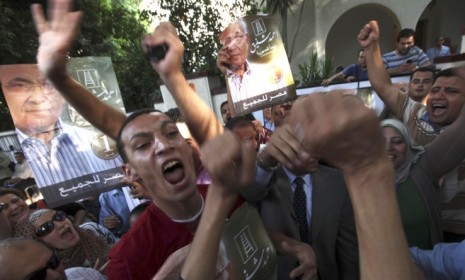Egypt's delayed election result: 3 takeaways
Election officials say they need time to address complaints from both candidates. Are they being thorough, or are the country's military leaders up to something?

A free daily email with the biggest news stories of the day – and the best features from TheWeek.com
You are now subscribed
Your newsletter sign-up was successful
Egypt's electoral commission has delayed announcing the winner of last weekend's presidential runoff; an announcement had been expected Thursday. Election officials said they needed more time to sift through 400 complaints of rule violations submitted by both campaigns. The Muslim Brotherhood has declared that its candidate, Mohammed Morsi, won with 52 percent of the vote, based on tallies by its monitors. But Morsi's rival — Ahmed Shafik, who was ousted leader Hosni Mubarak's last prime minister — has also claimed victory. The U.S. is already warning Egypt's military that it might cut $1.3 billion in annual aid if it doesn't transfer power to a civilian government by the end of June. How will the delay affect the already tense situation in Egypt? Here, three theories about what it means:
1. The result will be rigged...
Protesters in Tahrir Square "smell a political rat," says Euronews. The generals who have been running the country since the now critically ill Mubarak was ousted last year have already dissolved the newly elected, Islamist-dominated parliament, claiming sweeping powers they plan to keep until a new parliament can be elected. The Muslim Brotherhood's vote count has been confirmed as accurate by judges and outside observers. As one protester put it: Withholding the result means "there is an intention to rig it."
The Week
Escape your echo chamber. Get the facts behind the news, plus analysis from multiple perspectives.

Sign up for The Week's Free Newsletters
From our morning news briefing to a weekly Good News Newsletter, get the best of The Week delivered directly to your inbox.
From our morning news briefing to a weekly Good News Newsletter, get the best of The Week delivered directly to your inbox.
2. ...And we already know the winner: The military
Regardless of which candidate is declared the official winner, says Robert Fisk at Britain's Independent, Egypt's military leaders will emerge the true victors. They have already "ripped up" the results of the parliamentary vote the Muslim Brotherhood won, and "decided that they, and they only, are capable of writing a new constitution, and that they, and they only, will define the powers of the new president." The delayed vote result only means Egyptians will have to wait another day or two before the generals "crown the man who will do their bidding."
3. Egypt should brace for a confrontation
The Muslim Brotherhood has already had to stand by as the military took over its powers in parliament, says Richard Spencer at Britain's Telegraph. And the next president, no matter who he is, will have powers clipped by a last-minute army decree. But tensions are rising, and the split vote shows that whatever the result, Egypt is pretty much evenly divided between those who despise Shafik as a relic of the Mubarak regime and those who fear religious rule. But if Shafik, a former air force commander, is declared the winner, Egypt's Islamists will see it as nothing short of a coup d'état. If they feel the military is cutting them out of power altogether, it "could trigger a potentially disastrous confrontation."
A free daily email with the biggest news stories of the day – and the best features from TheWeek.com